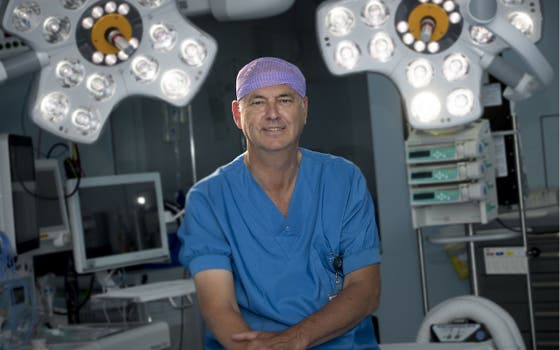Bas Veersema is retiring from UMC Utrecht

Bas Veersema, a man with a mission: to give new momentum to the gynecology department of the UMC Utrecht. His work as a gynecologist and professor of benign gynecology has had a significant impact on this department. On Friday, June 14, Bas gave his farewell speech in the Academy Building in Utrecht. Bas: 'Looking back, I am extremely proud of what we have accomplished together.'
Bas Veersema trained as a gynecologist at the VU Medical Center Amsterdam. After completing his training as a medical specialist, Veersema worked for 25 years as a gynecologist at the St. Antonius Hospital in Nieuwegein. Since 2002, he has been intensely involved with various subjects, including the topic of sterilization, a permanent form of contraception. He received his PhD in 2014 for his research on simpler methods of sterilization for women. In 2019, Bas was also appointed professor based on his research into benign gynecology (non-malignant gynecological conditions).
Eight years ago, in 2016, Bas joined the UMC Utrecht as the head of the department for reproductive medicine and gynecology. Not long after, he also took on the role of medical-scientific manager of the division Woman and Baby. In a relatively short time, he and his team succeeded in bringing the gynecology department at the UMC Utrecht to an academic level. Bas emphasizes that continuous developments in gynecological care are essential to provide the best care. ‘In addition to cancer, a malignant condition, benign conditions also need to receive attention in the academic hospitals.’
Developments in the Gynecology Department
‘When I see what the department now offers, and what we can achieve with this team, I am extremely proud,’ Bas continues. An example is a minimally invasive treatment performed in the outpatient clinic: a technique that avoids major surgery or anesthesia. ‘Nowadays, we can easily investigate and perform treatments using a small camera inserted through the vagina and uterus,’ Bas explains. This was not yet possible at the UMC Utrecht. ‘Over the past eight years, we have managed to make this practice standard care.’
The shift from major surgeries to simpler procedures is evident across the entire department. ‘Surgery where the abdomen is opened is almost no longer necessary,’ says Bas. ‘The procedures become less invasive for the patient by using laparoscopic and robot-assisted surgeries.’ He hopes this trend will continue: ‘The goal is to achieve the best possible results with the least invasive techniques.’
A hobby at work
Inventing and developing these kinds of techniques is like a hobby for Bas. 'It is enjoyable when an idea turns out to work,' he says. 'For instance, I developed a tool that actually made it to the market. It is an extremely thin scope that can be inserted into the uterus without any form of anesthesia.' While Bas is retiring from the UMC Utrecht, he will remain a member of the OR management team until the end of the year, and he will continue to focus on product development. Additionally, he is involved as an advisory board member for CHOICE, a sterilization technique in development. 'CHOICE is a promising development,' Bas explains. ‘We are developing an implant that can be opened and closed at will, making the sterilization procedure reversible.’
In his farewell speech, Bas addresses the sterilization of women and the evolution of this procedure over time. ‘The topic of sterilization has colored my career as a gynecologist,’ he says. ‘Until recently, there were rules for mandatory sterilizations or strict requirements.’ Despite the absence of current legislation regarding sterilization procedures in the Netherlands, there are still gynecologists who refuse to sterilize young women. This surprises Bas: ‘I have become intrigued by why some gynecologists are so resolute about turning away young women who desire to be sterilized.’
The message Bas wants to convey in his speech is that the choice for sterilization lies with the woman, not with the gynecologist. ‘Many gynecologists turn away (young) women to prevent regret. The study on which this decision is based has been misinterpreted. Women who do not want children and undergo sterilization do not regret it. The gynecologist is not responsible for this choice.’ Bas hopes that in the future, the decision of both men and women regarding sterilization will be respected.
Collaborations
What Bas will miss most about the UMC Utrecht are the great collaborations. Bas: ‘The interactions among colleagues, residents, staff, and students energizes me. But also, the contact with patients; there is nothing better than a patient expressing satisfaction with their outcome and the way they were treated.’ Bas is also proud of the collaboration with the Bergman Clinic that he helped establish: ‘Through this intensive collaboration, we can ensure appropriate care in the right place for the patient. We had this vision eight years ago, and now it's finally coming true.’
What advice do you have for the next generation of gynecologists?
‘Stay curious and continue to question whether we are doing the best for our patients. There is always something to learn, something we can do better.’
